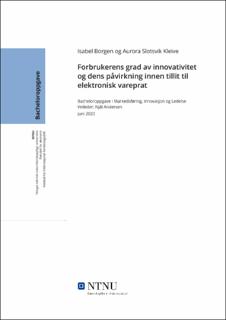| dc.contributor.advisor | Andersen, Njål | |
| dc.contributor.author | Kleive, Aurora Slotsvik | |
| dc.contributor.author | Borgen, Isabel | |
| dc.date.accessioned | 2022-07-14T17:19:30Z | |
| dc.date.available | 2022-07-14T17:19:30Z | |
| dc.date.issued | 2022 | |
| dc.identifier | no.ntnu:inspera:114615552:114619632 | |
| dc.identifier.uri | https://hdl.handle.net/11250/3005528 | |
| dc.description.abstract | Formålet med denne bacheloroppgaven er å forsøke å undersøke følgende problemstilling: “Hvordan påvirker forbrukerens grad av innovativitet deres tillit til elektronisk vareprat?”. Vi har utviklet to forskningsmodeller med totalt fem ulike hypoteser for å besvare problemstillingen på best mulig måte. Disse hypotesene er støttet opp av forskjellige teorier som gjøres rede for. Dette inkluderer teori for sosialt bevis (Cialdini, 2018), rammeverk for tro-holdning-oppmerksomhet (Komiak & Benbasat, 2004), sosial kognitiv teori (Bandura, 1977), elektronisk vareprat (Hennig- Thurau, 2004) og diffusjonsprosessen (Rogers, 2003). Å få en forståelse for faktorer som kan påvirke tillit til elektronisk vareprat, som er det vi undersøker, kan være viktig da elektronisk vareprat har blitt en utbredt kanal for å kunne nå ut til forbrukeren (Hudders et al., 2021).
Vi benyttet en kvantitativ tilnærming i oppgaven, hvor vi bruker tverrsnittstudie som forskningsdesign. Vi utviklet en spørreundersøkelse basert på validerte mål med en svarskala på 1-7 på hvert spørsmål. Her fikk vi et utvalg på 237 respondenter. Når vi videre analyserte dette, benyttet vi det statistiske dataprogrammet SPSS. Ved å ta i bruk SPSS, fikk vi en oversikt over deskriptiv data, testet validitet og reliabilitet, samt utførte en korrelasjonsanalyse og en regresjonsanalyse. Funnene fra regresjonsanalysen støttet tre av fem hypoteser. Vi fant blant annet ut at høy grad av innovativitet, påvirker tilliten forbrukeren har til både produktanmeldelser og influensere. Det var også statistisk sammenheng mellom struktur og stil i produktanmeldelser og forbrukernes tillit til dem.
Den empiriske analysen støtter det teoretiske argumentet om at sosial kognitiv teori, rammeverk for tro-holdning-oppmerksomhet og sosialt bevis er å betrakte som komplementære teorier som forklarer hvordan forbrukernes tillit blir påvirket. Oppgavens øvrige bidrag er at den identifiserer og får empirisk støtte for sentrale faktorer som påvirker sammenhengen mellom forbrukernes tillit til elektronisk vareprat og på hvilken kategori de befinner seg i diffusjonsprosessen. Kontrollvariablene vi antar kan ha en påvirkning er alder, kjønn og inntekt. | |
| dc.description.abstract | The purpose of this bachelor thesis is to attempt to answer the following question: "How does the consumer's degree of innovation affect their confidence in electronic word of mouth?". We have developed two research models with a total of five different hypotheses to answer the problem in the best possible way. These hypotheses are supported by various theories that are explained. This includes theory of social proof (Cialdini, 2018), framework for belief-attitude-attention (Komiak & Benbasat, 2004), social cognitive theory (Bandura, 1977), electronic word-of-mouth (Hennig- Thurau, 2004), and the diffusion process (Rogers, 2003). Gaining an understanding of factors that can influence trust in electronic word-of-mouth, which is what we are investigating, can be important as electronic word-of-mouth has become a widespread channel to reach the consumer (Hudders et al., 2021).
We have used a quantitative approach in the thesis, where we use cross-sectional study as a research design. We developed a questionnaire based on validated measures with a response scale of 1-7 on each question. Here we got a sample of 237 respondents. When we further analyzed this, we used the statistical computer program SPSS. Using SPSS, we obtained an overview of descriptive data, tested validity and reliability, and performed a correlation analysis and a regression analysis. The findings from the regression analysis supported three of five hypotheses. Among other things, we found that a high degree of innovation affects the consumer's trust in both product reviews and influencers. There was also a statistical correlation between structure and style in product reviews and the perceived trust that the consumer has towards it.
The empirical analysis supports the theoretical argument that social cognitive theory, frameworks for belief-attitude-attention and social evidence are to be regarded as complementary theories that explain how consumer confidence is affected. The other contribution of the thesis is that it identifies and receives empirical support for key factors that affect the connection between consumers' confidence in electronic word-of-mouth, and in which category they belong to in the diffusion process. The control variables we assume may have an impact are age, gender and income. | |
| dc.language | nob | |
| dc.publisher | NTNU | |
| dc.title | Forbrukerens grad av innovativitet og dens påvirkning innen tillit til elektronisk vareprat. | |
| dc.type | Bachelor thesis | |
